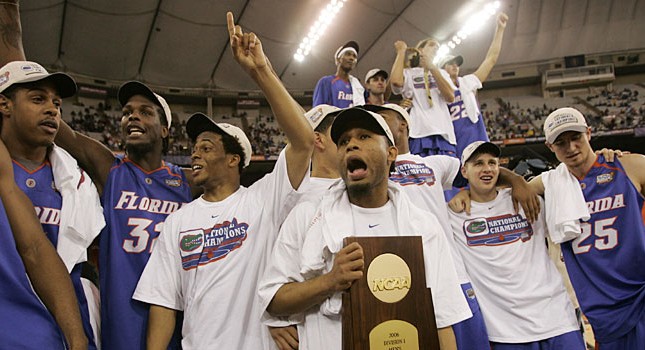A national champion will be crowned Monday night in Houston.
It won’t be a first-time national champion.
North Carolina enters the 2016 title game with five national crowns. Villanova doesn’t have as many, but it does have one, the immortal 1985 victory over Georgetown in Rupp Arena. This very simple fact leads to another plain fact, which — in turn — gives way to an eye-popper of a fact.
The plain fact is this: When Oklahoma lost in the national semifinals, the wait for a first-time national title increased to 10 full seasons. The last first-time national champion in men’s college basketball was Florida in 2006, shown above in our cover image. The Gators beat UCLA in Indianapolis, one year before repeating in 2007 against Ohio State in Atlanta.
Here’s the eye-popper of a fact: In this — the 78th year of the NCAA tournament — a 10-year drought for first-time national champions is unprecedented. The reality of a chaotic and disordered 2016 regular season might have seemed to be the perfect incubator in which a first-time champion would be created. Instead, it’s an old-money title game between two established programs from brand-name conferences (although the Big East in which Villanova currently resides is nothing like the league the Wildcats used to inhabit).
Let’s take a brief stroll through the history of national champions, touching on the first-time winners at various points along the line.
The first repeat winner was Oklahoma State — then known as Oklahoma A&M — in 1946, the eighth NCAA tournament. Kentucky was the only other team to repeat in the 1940s (1949). Kentucky (1951, 1958) Indiana (1953), and San Francisco (1956) repeated in the 1950s, meaning that a majority of champions were still first-timers.
In the 1960s, only two schools repeated as champions, but UCLA repeated four times, winning in 1965, 1967, 1968, and 1969 after first winning in 1964. When the Bruins won four more titles in the 1970s and two other schools — Indiana (1976) and Kentucky (1978) — also repeated, a majority of the decade’s 10 national titles became repeat instances.
In the 1980s, a majority of champions were repeat winners (6 repeaters, 4 first-timers). In the 1990s, however, the pendulum shifted toward perfect balance, with a 5-5 split between repeat winners and first-time champions.
Here’s where the drama of this topic becomes more pronounced: From 1997 through 2003, a majority of champions were first-timers: Arizona (1997), Connecticut (1999), Maryland (2002), and Syracuse (2003). Given that run of results, it appeared that we had entered into a brave new world of college basketball, where the vistas of possibility for up-and-coming programs were as bright as humanly possible.
Since Syracuse and Carmelo Anthony in New Orleans in 2003, however, only Florida in 2006 has stepped forward as a first-time champion.
Over the past 10 years of national title games — with this one in 2016 obviously a meeting of previous winners — a total of only two schools have had a chance to win a first-time championship: Memphis in 2008, and Butler twice in 2010 and 2011. Wisconsin won the 1941 title, so it was not playing for a first championship last season.
College basketball was so wide open over the past four and a half months. Yet, first-time champions need not apply for the first Monday night of April.
The wait continues.

